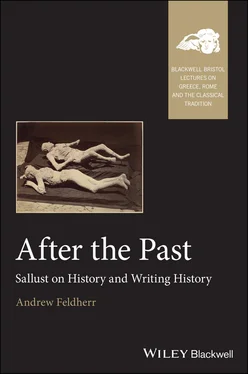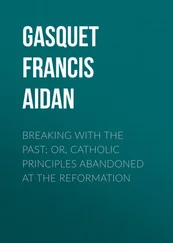24 24 Gunderson (2000, 90) also observes the prominence of first-person pronouns in the final sentences of this chapter, but for him this betokens Sallust’s claim to an authorial mastery that he associates with virtus rather than the diminution of authority I am suggesting.
25 25 The link between vis and virtus that emphasizes the progression derives perhaps from etymology as well as assonance. While virtus transparently suggests the qualities of a man (vir), the form of that word in turn could be explained by the greater force (vis) attributed to the male. See Maltby (1991, 647 and 649 s.v.v. vir and virtus).
26 26 For the contemporary intellectual challenges involved in reconciling the traditional Roman pursuit of glory with different Greek ethical systems, see Long (1995, esp. p. 217 n. 11, on Sallust).
27 27 Batstone (1990, 121); also Gunderson (2000, 90–1), with fuller analysis.
28 28 It may also be noted that the historical moments that Sallust depicts here do not so much describe the contents of Herodotus’ and Thucydides’ histories as their starting points: Cyrus’ rise to power in Asia is the prelude to the conflict between Greeks and Persians, and the unified supremacy of Sparta and Athens fractures in Thucydides’ narrative. From this perspective, historiography no longer provides the sure proof of this fact about human nature but rather suggests its insufficiency or even contestation, as though the story starts once the conclusion seems to have been reached.
29 29 Since my analysis of this passage resembles in many respects that of Gunderson (2000, 91–8), it may be helpful for me to differentiate our arguments. He as well sees this moment in the text as the point of contact between philosophy and history, and also as putting the historian very much within a historical narrative. His analysis stresses a close parallelism between Sallust’s intellectual mastery and the will for political domination that is his subject. The inherent instability of Sallust’s intellectual position, which results from the inevitable duality of the oppositions he tries to hierarchize, between, for example, master and slave and mind and body, stands revealed when he applies them to an analysis of historical processes. The projection of Sallust’s desire to impose authority by prioritizing mind over body runs up against the recognition that this is itself a political struggle as much as an intellectual one. My reading by contrast relies on the possibility of keeping the strands of Sallust’s discourse apart, of allowing for alternative readings of the passage rather than inevitably collapsing them into a deconstructive one.
30 30 Batstone (1988, esp. 14 and 29; also 2010b, 61–4).
31 31 For an account of how this formula is, even in Cicero, immediately complicated when it is applied to real history (Herodotus is awfully enjoyable), see Krebs (2009, 102) and Woodman (2012, 9–10).
32 32 The context justifies this transition from judging history to interpreting it, since the issue that prompts the reflection itself involves a problem of interpretation: Is the “real” tree under which the dialogue is set to be identified with a tree mentioned in Cicero’s (epideictic) poem on Marius?
33 33 Thuc. 3.82.4. On the differences between Cato and Thucydides, and for a fuller account of the sentence’s role in Sallust’s text, see Batstone (2010b, 47–8); also Gunderson (2000, 87). See also Büchner (1983), who however takes Cato’s words as an expression of Sallust’s own viewpoint. In an important recent discussion, Spielberg (2017) reads the Thucydidean passage as a “meta-topos,” an exposure of a common rhetorical trick that therefore distinguishes the discourse of historiography from partisan abuses of language. By making a similar charge part of Cato’s speech, she argues, Sallust again presents it as a polemical strategy, and this furthers his “attempts … to set himself above the contemporary moral and political collapse he describes” (p. 340).
34 34 We may even suspect the loss of some noun, like robbery (latrocinium?), that would provide a more honest description of the action of giving away what does not belong to you.
35 35 For an introduction to Varro’s approach to language, see Zetzel (2018, 38–46). My own appreciation of the importance of historicity in de Lingua Latina depends on an as yet unpublished conference paper delivered by Katharina Volk.
36 36 For the metaphorical continuities with the imagery of the preface, see Krebs (2008, 592).
37 37 E.g. Probus, Gramm. 4.47.17; further references in Maltby (1991, 54–5 s.v. (b)).
38 38 The phrase bonae artes echoes its earlier use at Cat. 2.9, again accompanied by many assonantial intimations of virtus: verum enim vero is demum mihi vivere atque frui anima videtur qui aliquo negotio intentus praeclari facinoris aut artis bonae famam quaerit. And there is a logical connection as well: in the earlier passage, Sallust insists that virtus can manifest itself in many kinds of activity, which may be a contributing factor to the difficulty of recognizing it.
39 39 Such logic was “circular” also in antiquity, as the Greek phrase “diallelos tropos” in Sextus Empiricus shows (Pyr. 1.169). The Latin circulus in probando is later.
40 40 Note the shift from the imperfect to the present between the two sentences.
41 41 McDonnell (2006, 384).
42 42 See esp. Batstone (2010b). My understanding of Batstone’s reading was also aided by a still unpublished working paper, presented in 2013, entitled “Sallust, Kristeva and Intertextual Prosaics”.
43 43 Batstone (1990, 129–30).
44 44 Moles’ (1983a, 779) description of Brutus as “an Academic with a strong Stoic tinge” has been called into question by Sedley (1997).
45 45 Tyche is a notoriously variable concept. In this passage the dominant sense seems to be the stoic idea of tyche as the causal force evoked by humans who imperfectly understand the workings of providence (this was, after all, spoken by Brutus at a moment of extreme despair). The kinship between this idea and apparently contradictory historiographic (particularly Polybian) uses of tyche/fortuna (i) to refer to what cannot be definitively explained and (ii) to suggest an active force shaping events is traced by Brouwer (2011).
46 46 A similar possibility is described in Melchior’s reading of the scene (2010, 411).
47 47 Ellen O’Gorman has observed to me viva voce how the language used to describe the viewing of the corpses can recall directly the readers’ handling of text: volventes was used for the unrolling of a book scroll, and cognoscere also describes “reading”.
Конец ознакомительного фрагмента.
Текст предоставлен ООО «ЛитРес».
Прочитайте эту книгу целиком, купив полную легальную версию на ЛитРес.
Безопасно оплатить книгу можно банковской картой Visa, MasterCard, Maestro, со счета мобильного телефона, с платежного терминала, в салоне МТС или Связной, через PayPal, WebMoney, Яндекс.Деньги, QIWI Кошелек, бонусными картами или другим удобным Вам способом.












